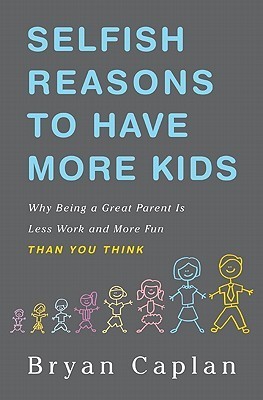More on this book
Community
Kindle Notes & Highlights
Selfish Reasons to Have More Kids: Why Being a Great Parent is Less Work and More Fun Than You Think
by
Bryan Caplan
Read between
April 1 - April 4, 2025
The claim of this book, rather, is that current and prospective parents have accidentally tipped their scales against fertility. We may feel sure that the pursuit of happiness and kids (or at least more kids) are incompatible, but it is in the average person’s enlightened self-interest to have more kids.
many of the benefits of children come later in life. Kids have high start-up costs, but wise parents weigh their initial sleep deprivation against a lifetime of rewards—including future grandchildren.
Adoption and twin research provides strong evidence that parents barely affect their children’s prospects. If parents gave themselves a big break—or redoubled their efforts—kids would turn out about the same.
Four kids are a handful when you’re thirty. When you’re sixty, the story reverses. By that stage, each of your four children—and whatever grandchildren they give you—will probably be a joy.
I’m not trying to convince everyone to have kids. I’m trying to convince people who are at least mildly interested in being a parent that they should have more kids than they originally planned.
The childless can readily imagine being parents, and by the time they’re in their forties, most prefer this fantasy to their reality.
the top seven activities—from sex (“intimate relations”) to watching TV—are all forms of recreation. As far as worklike activities go, enjoyment of child care is slightly above average.
women enjoy taking care of their children more than working outside the home.
By the standards of the Sixties, modern dads do enough child care to pass for moms—and modern moms do enough child care to compete for Mother of the Year.
Before you do something for your child, try asking yourself three questions. 1. Do I enjoy it? 2. Does my child enjoy it? 3. Are there any long-run benefits?
The screams of a baby are like an offer: “I’ll stop screaming if you give me some attention.” And it is not a vague offer. Give the baby attention and the crying stops. After only a few goes, a little baby can train its parents nicely.
Discipline is like dieting: It works when tried.
The oil-change incident wasn’t merely a failure of common sense. We were moving to Princeton so I could finish my PhD in economics, yet the well-known fact that money can be exchanged for goods and services slipped my mind.
Money can buy happiness if you spend it the right way.
few consider the dangers of secondhand stress. If you make yourself miserable to do a special favor for your child, he might enjoy it. But if he senses your negative feelings, he might come to share them. Secondhand stress is one of kids’ leading grievances.
The best available evidence shows that large differences in upbringing have little effect on how kids turn out. While healthy, smart, happy, successful, virtuous parents tend to have matching offspring, the reason is largely nature, not nurture.
Moderate foresight tells you to stop having kids. If one infant makes you tired and cranky, why have another? High foresight has a simple response: Infancy is a passing phase, but children last a lifetime. Costs fall: The older kids get, the easier they are to care for. Last week, we left our seven-year-olds home alone for the first time; before long, they’ll be babysitting their little brother. Benefits increase over time, too. Kids who walk and talk are more fun than newborns who sleep and cry.
When they’re grown, all your children will likely be a plus. You’ll enjoy their company and take pride in their accomplishments but no longer bear the responsibility. As an added bonus, every child is another chance for grandchildren.
People who want kids they can’t have are just as “trapped” as people who have kids they don’t want. In fact, irreversibility cuts in favor of kids. As we’ve seen, regret is abnormal for people who have kids, and normal for people who missed their chance.
The claim I stand by: Typical parental feelings paired with high foresight imply more kids than typical parental feelings paired with moderate foresight.
Having a child is a serious decision. But if you take the decision seriously enough, you won’t just avoid pregnancy until you’re ready for kids. You’ll also start having kids before it’s too late to have as many as you want.
Once we doubt our motives or qualifications, many of us can’t help but wonder if we would be wronging a child by bringing him into the world. What’s funny about these doubts is that virtually no one feels that it was unfair for their parents to have them.
YOU CAN HAVE TOO MANY CHILDREN, BUT NOT TOO MANY grandchildren. Like your kids, they’re cute, they’re playful, and they bring hope. Unlike your kids, you can send them home when you’ve had enough. It’s the deal of a lifetime.
What are the in-laws from heaven like? My two-word slogan is quietly useful.
In the United States, one cycle of in vitro fertilization costs about $12,000—and that’s when the mother uses her own egg and carries her own baby. It sounds expensive, yet it’s infinitely cheaper than it used to be. In 1970, in vitro was beyond the reach of billionaires, for the technology did not exist.
I’m an overgrown kid at heart, so it’s no wonder that fatherhood agrees with me.
once you accept that your children’s future is largely up to them and remember that your happiness counts, too, an unplanned set of twins is no big deal. Before long, you’ll probably think they’re the best thing that ever happened to you.


